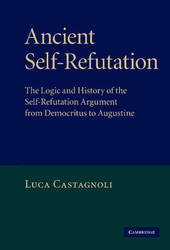
|
Ancient Self-Refutation: The Logic and History of the Self-Refutation Argument from Democritus to Augustine
Hardback
Main Details
| Title |
Ancient Self-Refutation: The Logic and History of the Self-Refutation Argument from Democritus to Augustine
|
| Authors and Contributors |
By (author) Luca Castagnoli
|
| Physical Properties |
| Format:Hardback | | Pages:416 | | Dimensions(mm): Height 235,Width 158 |
|
| Category/Genre | Western philosophy - Ancient to c 500
Philosophy - logic |
|---|
| ISBN/Barcode |
9780521896313
|
| Classifications | Dewey:168 |
|---|
| Audience | | Tertiary Education (US: College) | |
|---|
| Illustrations |
4 Halftones, unspecified
|
|
Publishing Details |
| Publisher |
Cambridge University Press
|
| Imprint |
Cambridge University Press
|
| Publication Date |
30 September 2010 |
| Publication Country |
United Kingdom
|
Description
A 'self-refutation argument' is any argument which aims at showing that (and how) a certain thesis is self-refuting. This study was the first book-length treatment of ancient self-refutation and provides a unified account of what is distinctive in the ancient approach to the self-refutation argument, on the basis of close philological, logical and historical analysis of a variety of sources. It examines the logic, force and prospects of this original style of argumentation within the context of ancient philosophical debates, dispelling various misconceptions concerning its nature and purpose and elucidating some important differences which exist both within the ancient approach to self-refutation and between that approach, as a whole, and some modern counterparts of it. In providing a comprehensive account of ancient self-refutation, the book advances our understanding of influential and debated texts and arguments from philosophers like Democritus, Plato, Aristotle, Epicurus, the Stoics, the Academic sceptics, the Pyrrhonists and Augustine.
Author Biography
Luca Castagnoli is Lecturer in Ancient Philosophy at the University of Durham. He is the author of several articles on a variety of themes in ancient philosophy.
Reviews'In this thoroughly stimulating and in every way impressive book, Castagnoli offers a comprehensive examination and analysis of a large number and variety of self-refutation arguments in ancient philosophy ... C.'s command of such exceedingly wide and complex material is nothing short of masterful, as is his acutely rigorous, sharply focussed and immensely detailed use of tools - philological, historical, logical - for the handling of it.' Vasilis Politis, Classical Review 'Castagnoli's book analyzes with brilliance, incision, sensitivity, and exhaustive depth more than a dozen classes of Ancient Greek and Roman self-refutation arguments ... Ancient Self-Refutation is an extremely edifying, useful, and serious book of philosophy. Each of Castagnoli's chapters is full of philosophical freshness, perspicuity and information, and each must from now on serve as essential reference.' Christopher Moore, Bryn Mawr Classical Review 'The particular analyses which collectively constitute Castagnoli's book are always refined and always worth pondering. And they are also, I think, sometimes true. Most scholars (myself among them) have assumed that ancient reversals are self-refutation arguments. Castagnoli's thesis is the contrary of that assumption; and if Castagnoli has not shown that his thesis is true, he has shown that the assumption is false ... Anyone who has a passing interest in ancient logic and is suitably attired in leather boots will read [Ancient Self-Refutation] with profit - and not without a certain austere pleasure.' Jonathan Barnes, Mind 'This is an outstanding study. Over the course of fifteen chapters, Castagnoli offers sharp analysis and clear insight into the nature and logic of some of, if not most of, the classic self-refutation arguments found in the ancient authors ... The argumentation throughout is tight, the textual analysis sharp, and the writing style agreeably fluid. Castagnoli is thorough in documenting the secondary material and gracious in his acknowledgments and disagreements ... the book is meticulously edited and beautifully produced. In short, this is a model work.' Alan Silverman, Ancient Philosophy '... [this] book is fascinating, well-written, and a joy to read ... Accessible to both the scholar and the layman, it would serve well as supplementary material on a course on ancient dialectics as well as a resource for the historian and philosopher of the ancient Greek and Latin tradition.' Sara L. Uckelman, Logical Analysis and History of Philosophy
|